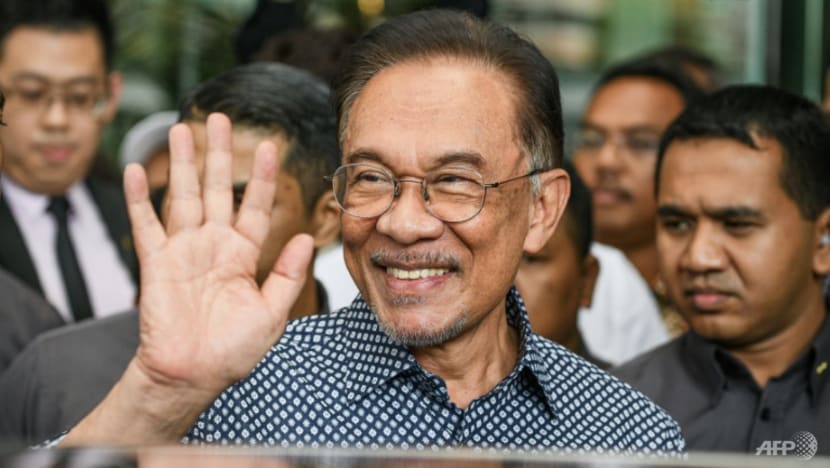Anwar Ibrahim: The man who waited decades to be Malaysia's prime minister

It took five days following a general election to finally settle the issue of who would lead the country.
But for Anwar Ibrahim, his swearing-in on Thursday (Nov 24) as Malaysia's 10th prime minister ended a much longer wait.
EARLY POLITICAL CAREER
Born in Aug 10, 1947 in Penang, Anwar graduated with a Bachelor’s degree in Malay Studies at the University of Malaya.
As an Islamic youth leader, he was arrested in 1974 during a student protest in support of rural farmers and served 20 months in jail.
In 1982 he joined then-prime minister Mahathir Mohamad’s United Malays National Organisation (UMNO), the main component party in the Barisan Nasional alliance.
In 1983, he was appointed minister of culture, youth and sports, before moving on to head the agriculture ministry in 1984 and the education ministry in 1986.
He then served as minister of finance from 1991 until 1998, simultaneously holding the office of deputy prime minister from 1993. However, he fell out with Mahathir over how to handle the 1997 Asian financial crisis.
JAIL TERM
Once seen as Mahathir’s successor, Anwar was subsequently fired in 1998. He was charged with sodomy, a crime in Malaysia, a move he said was aimed to put an end to his political career.
He led tens of thousands in a protest march in Kuala Lumpur on Sep 20, 1998, but was arrested hours later at his home.
A week later, Anwar appeared at his sodomy trial with a black eye, which then became the symbol of the political party he started. Later, the police chief at the time admitted to having assaulted Anwar in prison.
Anwar was sentenced to six years in jail for corruption in 1999, with an additional nine years for sodomy in 2000. The two sentences ran consecutively.
"This man cannot be allowed to become a leader in a country like Malaysia," Mahathir said about Anwar at a press conference in 1998.
Anwar was freed in 2004, only to be jailed again for sodomy in 2015, two years after leading the opposition to its best electoral performance yet, winning the popular vote for the first time despite not securing a parliamentary majority.
He remained active as an opposition leader while in prison.
POLITICAL RESURGENCE
Anwar and Mahathir put their differences aside in 2018, agreeing to work together to oust the ruling Barisan Nasional party amid widespread graft accusations among its leaders.
Barisan’s leader Najib Razak has since been jailed over a multi-billion-dollar scandal linked to state fund 1Malaysia Development Berhad.
After their win, Mahathir requested a royal pardon for Anwar and promised to hand power to him within two years. However, the coalition collapsed after 22 months, leaving Anwar in the cold again.
In the 2022 general election, Anwar's Pakatan Harapan (Alliance of Hope) coalition won the most number of seats, but fell short of the required majority.
Prior to the elections, he had faced calls to step down as some believed he had held on for too long.
In a recent interview with Reuters, Anwar said he knew his limits, when asked if this election would be his last.
"Whether I am considered relevant or not in the next few years, that's for the people to decide," he said.
After the election resulted in a political stalemate - with rival Perikatan Nasional also claiming to have the numbers necessary to form a government - the king intervened to break the impasse by calling for a unity government.
On Nov 24, Anwar's appointment was confirmed by the palace and hours later, he took his oath of office, fulfilling a decades-long quest to become Malaysia's prime minister.

















